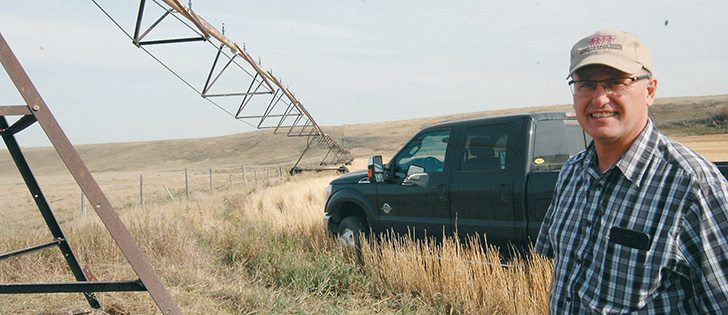CARMANGAY, Alta. — Kevin Auch is happy to see lots of earthworms in the soil surrounding his just-germinated winter wheat crop.
He pointed them out after he scooped a handful of earth from a field he farms beside the Little Bow River in southwestern Alberta.
The farmer from Carmangay says he is sure the soil is in better health now than when his father farmed it in the 1960s.
That’s no slight to his father, Don, who farmed with the best-known practices at the time. However, Kevin is a proponent of zero-till farming and said he has seen its positive results.
Read Also

Farm equipment dealership chain expands
This summer, AgWest announced it was building two new dealership buildings in Manitoba to better service its expanding market area — one in Brandon and the other in Russell.
“I’m replacing the nutrients that go back in my soil,” he said.
“I’m no-till. I’m allowing the plants to pull the nutrients out without having to beat up the soil and kill the soil flora and fauna to get those nutrients.”
Kevin has lived on this farm all his life and now farms about 5,000 acres with his wife, Laurel.
They’ve raised three children there. Curtis, 22, is in his first year of law school in Edmonton. Jeffrey, 20, has autism and lives at home. Leah, 17, is in her last year of high school in nearby Vulcan.
Kevin and Laurel met when both were at the University of Alberta. Kevin emerged with an agriculture degree and Laurel with a bachelor of commerce degree. She is also a former chartered accountant.
“She does my taxes so that’s kind of nice, and my books,” Kevin said.
“She’s not much for running machinery, but she’s about the best office manager I could ever ask for.”
His enthusiasm for farming is evident as he points out what grew this year in his now-harvested fields. The Auchs grow winter and spring wheat, durum, barley and flax. They also keep eight cows, although Kevin makes no ranching claims.
“It’s not an efficient cattle farm, and I don’t claim to be a cowboy,” he said with a smile. “I’m a grain farmer with a few cows.”
Only one field of flax remained to be harvested Oct. 1, and it was due to meet the combine the following day.
This year brought a good harvest but wasn’t without its challenges.
“I had custom combiners in and they did a good percentage of my crop. Probably 60 percent of my harvest was done by custom combiners,” he said.
“That was a little more than usual. I had a couple breakdowns with my combine. I’m trying to run a 50-year-old combine … so I shouldn’t complain too much.”
Kevin is vice-chair of the Alberta Wheat Commission, with which he has been involved since its inception. He became involved because of his concern for the wheat industry once the Canadian Wheat Board was privatized.
“I wanted to see it succeed,” he said about the AWC.
“We didn’t have an all-wheat commission in Alberta and with some of the things that the wheat board was doing with their marketing … they were sending trade missions and that kind of stuff, so that we could see with the wheat board single desk ending, that that stuff would all end, too,” he said.
“We knew there was going to be a void. We knew that something had to be done.”
Kevin was also on the Alberta Canola Producers Commission for six years, serving the last two as chair, is a former board member of the Southern Alberta Conservation Association and currently serves on the board of the Carmangay seed cleaning plant.
“That’s kind of where I got my grounding in no-till,” he said.
“We’d get all these speakers and they’d be telling us all the advantages and all the things that would happen in a no-till system and I thought, ‘well, that’s the way we’re going to have to go if we want to be sustainable into the future.’ ”
Kevin keeps a busy pace, said Laurel, but she enjoys it and the other aspects of farm life.
“I love the peace and quiet and privacy. And I like being able to set my own pace,” she said.
She and Kevin don’t put pressure on their children to get into agriculture.
“They have to find their own thing,” said Laurel.
“You have to love it. There’s too many frustrations with it if you don’t, if it’s not something you have a passion for.”
She and Kevin see agriculture’s future as bright, in part because of farmers’ innovation and business attitudes.
“I think as long as we let farmers do their thing, I think we’re very competitive,” said Kevin.
“We can always figure out ways of producing our crops and doing our thing if we’re allowed to do it.”
He and Laurel agree that there is a gap between farmers’ production methods and consumers’ understanding of those methods. For them, it comes back to care for the land and farming sustainably.
“Part of being sustainable is being able to make enough profit to keep going because if farmers can’t make any profit, then they can’t produce food in the future. The whole thing has to be sustainable,” said Kevin.
“We have to educate the consumer on what is possible and what is actually healthy because there’s a lot of misinformation about what we do.”
















